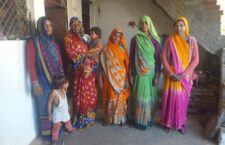Rural north Indian women re-evaluate the meaning of ‘Independence’ this year of lockdowns #16DaysofActivism
Freedom, autonomy, independence: the coronavirus pandemic is forcing us to reconsider the meaning of these terms we use so indiscriminately. When access to resources has been curtailed, when being confined is the norm, when safety equals sequestering, how do we begin to re-evaluate the place of ‘Independence’ in our lives? For the young women of Bundelkhand, the coronavirus lockdown has snatched away the hard-earned lives that they had built for themselves, far from the claustrophobia of their village-homes. These young women have been living on their own terms after escaping the shackles of parochial domesticity, gossiping neighbors, and judgmental communities. They were thriving in the anonymity of the big city before the paranoia and fear engendered by the coronavirus and lockdown yanked them harshly back to their former realities. This August 2020, we spoke to Bundelkhand’s women to ask, what does independence mean in the time of pandemic?
Sabita Anurag, a medical student from Banda who is pursuing a nursing degree in Kanpur says, “Kanpur has a really good higher education system. So I thought that I would come here and pursue my education. I came here and did my nursing…Living in the city, I have the freedom to plan my studies, my time to go out, my sleep schedule, my leisure time. So we feel good because we feel free as no one is restricting us. I feel very glad.” Several of the women we spoke to concurred with Sabita’s sentiment; the big city is synonymous with liberation, for them. It has been only 5 days since Sabita returned home, but she is already feeling the pinch: “Restrictions exist even for the smallest of things now. Like if I am sitting at home and getting bored and want to go out for a stroll, family members say ‘don’t go, the coronavirus is spreading a lot.’ So the biggest restriction is that I can’t leave home and I feel really suffocated because I also would like to go out, breathe some fresh air and roam around a little a bit. But family members say no, so this has become difficult for me.”
For students like Sabita, the lockdown was predictably accompanied by a colossal blow to her studies and education. “I was in Kanpur when the lockdown was announced. Then colleges started closing. Then I came home and the biggest effect on me is that I would attend classes online, daily, but I didn’t have any copies (notebooks) so I had a hard time completing my notes and studies. I was wondering that if the final exams happened, then how would I complete my studies? How would I study for the exams? So, at that time, it was a big problem but now it is not because all the medical colleges have opened. So, now there is no difficulty. There is just difficulty in traveling to and from college while making sure you are keeping safe.”
When asked about the status of her internet connection back home, Sabita just laughs: “Where do I begin? During my online classes, that was the biggest problem I faced. I wasn’t able to study. My ma’am used to mark me absent…Ma’am did say some things to me and had marked me absent quite a few times, so I got stressed about the poor effect it would have on my marks.” However, Sabita remains resolute and hopeful about some semblance of normalcy in the future: “My mother wants me to study and be independent and do good for my family, the neighborhood and others. So my aim is to study and work as a good nurse. And I promise to do my best to serve my community and my country.”
While Sabita is intent on persisting beyond all odds, Archana from Mahoba is not to be left behind. Shocked and definitely unimpressed by the wage gap between the salaries of men and women in the city, she decided to masquerade as a man to be paid fairly. “I used to remove the covers of big cars and put chains on them as well… I would work from 7 am to 9 pm and would get Rs 8,000 per month as salary…I enjoyed living outside [in the city]. Like here in the village if I wore jeans, some people would comment and say “see this girl, she roams around with boys and looks at the clothes she wears and it doesn’t look good over here, in UP, if girls behave like this’. This is how girls are raised here….But, outside, all this doesn’t happen. You can eat whatever you want, you can wear whatever you want, nobody will stop you…” Archana, one among 10 siblings, is keen to support her family. Her mother works as a cook, earning a meagre sum of 1500 rupees, which is grossly insufficient to run a family. So, when Archana was visiting one of her sisters in Delhi, she jumped at the chance to do some work on the side to buttress her family’s income. “My sister lives in Delhi. She called me and told me about the job so I shifted to Delhi and got the job…They were paying the boys more than the girls. The boys would get Rs 8,000 while the girls would get Rs 5,000 so I thought why not become a boy, then I’ll get Rs 8,000. And the job is the same, whether a girl does it or a boy. So I became a boy and would get a salary of Rs 8,000. And I named myself Mohan.” Archana hopes to also pursue her education, if schools open up soon. However, the lure of the money, life, and independence of Delhi calls to her.
Dressing like a boy was not a novel experience for this sprightly young girl of 16. Archana has a twin brother, and her childhood was spent dressing identical to him. Her family did not mind, as long as she was comfortable in her attire. However, the mohallewalas had a lot to say about this tom-boyish girl who dressed like a man because she could and wanted to. Whether in her hometown, or at work as a boy in Delhi, Archana is a firm believer in independence and self-determination. For Archana, then, independence is about equality of both employment and self-expression: “people do think that girls can’t do the work, that boys will do it quickly and girls will delay the work. But this is not true. I also work and I know that everyone is equal. Although nobody in UP agrees.”.
Societal stigma in the hinterlands of India seems to be a serious stressor for young, savvy women. While the ability to blend into crowds and the relative freedom afforded by the city allows them to engage with life on their own terms, the stifling nexus of family-neighbours-community back home seems to suck the life out of them. Aradhana Tiwari, a call center employee in Ayodhya likens community gossip to torture: “In the city, I could wear whatever I wanted, meet whoever I wanted, but here I have to stay at home only. My family doesn’t say anything but people in the neighbourhood torture me with rumours.“
Shreya Tripali, a model from Chitrakoot minces no words, when she says it better than we ever could: “They do say the country has become independent but we haven’t gotten independence yet. People’s thought processes are still backwards. Like if a man has a “dirty” stare then it is the woman’s duty to cover up. That is ludicrous. Keep the boys inside, na? So, in that sense, I don’t think we have gotten freedom. Because people talk about equality but they still don’t treat women equally.”
Also Read: Mind the #WageGap #16DaysofActivism campaign

